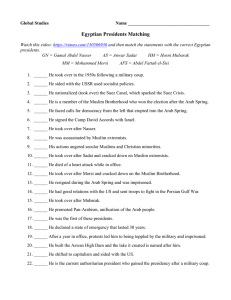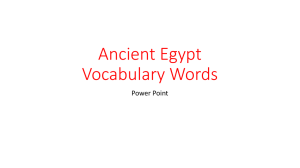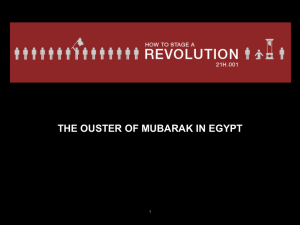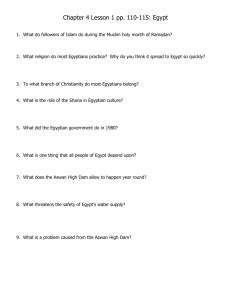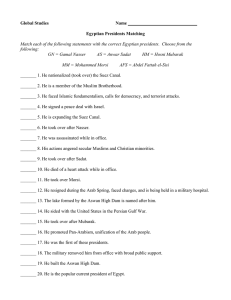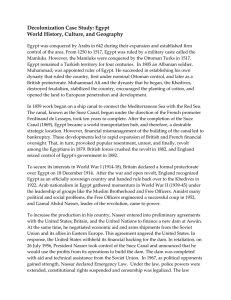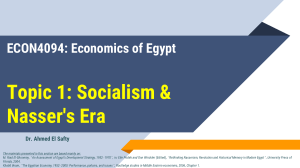Modern Egypt Notes
advertisement
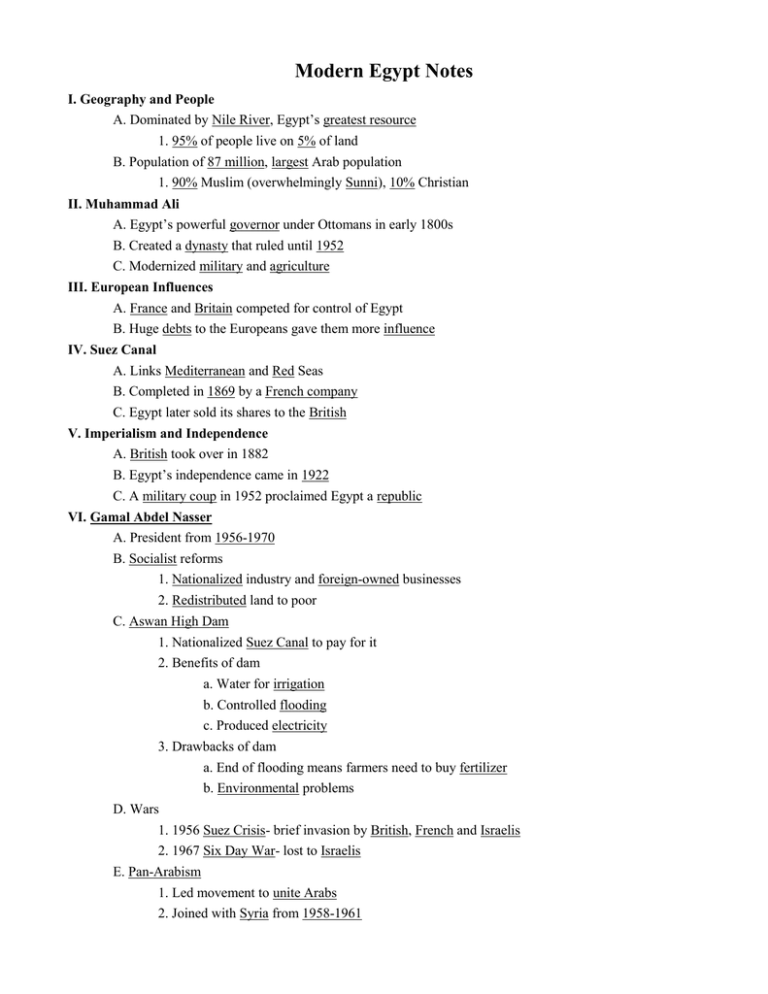
Modern Egypt Notes I. Geography and People A. Dominated by Nile River, Egypt’s greatest resource 1. 95% of people live on 5% of land B. Population of 87 million, largest Arab population 1. 90% Muslim (overwhelmingly Sunni), 10% Christian II. Muhammad Ali A. Egypt’s powerful governor under Ottomans in early 1800s B. Created a dynasty that ruled until 1952 C. Modernized military and agriculture III. European Influences A. France and Britain competed for control of Egypt B. Huge debts to the Europeans gave them more influence IV. Suez Canal A. Links Mediterranean and Red Seas B. Completed in 1869 by a French company C. Egypt later sold its shares to the British V. Imperialism and Independence A. British took over in 1882 B. Egypt’s independence came in 1922 C. A military coup in 1952 proclaimed Egypt a republic VI. Gamal Abdel Nasser A. President from 1956-1970 B. Socialist reforms 1. Nationalized industry and foreign-owned businesses 2. Redistributed land to poor C. Aswan High Dam 1. Nationalized Suez Canal to pay for it 2. Benefits of dam a. Water for irrigation b. Controlled flooding c. Produced electricity 3. Drawbacks of dam a. End of flooding means farmers need to buy fertilizer b. Environmental problems D. Wars 1. 1956 Suez Crisis- brief invasion by British, French and Israelis 2. 1967 Six Day War- lost to Israelis E. Pan-Arabism 1. Led movement to unite Arabs 2. Joined with Syria from 1958-1961 VII. Anwar Sadat A. President from 1970-1981 B. Rolled back socialism 1. Supported private industry 2. Encouraged foreign investment C. Foreign Affairs 1. President during the 1973 Yom Kippur War 2. Made peace with Israel in 1979 Camp David Accords 3. Relations with other Arab nations hurt D. Assassination 1. Killed by Muslim extremist military officers in 1981 VIII. Hosni Mubarak A. President from 1981-2011 B. Foreign Affairs 1. Honored treaty with Israel 2. Improved relations with Arab nations 3. Joined with US for 1991 Persian Gulf War D. Domestic Politics 1. Was accused of being a dictator 2. Faced opposition from pro-democratic forces on left 3. Faced opposition and violence from Islamic fundamentalists on right E. Arab Spring 1. Forced to step down 2. Sentenced to life in prison, but charges later dismissed 3. In failing health and serving a 3-year prison term in a military hospital IX. Mohammed Morsi A. President from 2012-2013 B. Member of Muslim Brotherhood 1. Most influential Islamic group in the Arab world 2. Once a terrorist group, but later renounced violence 3. Most organized political party when Mubarak fell C. Actions in Office 1. Swept military from power 2. Won acclaim by brokering a ceasefire between Israel and Hamas 3. Granted himself wide powers 4. Adopted a new Islamic-leaning constitution D. Overthrow 1. Millions of protesters demanded Morsi’s resignation a. Distrusted by secular Muslims and Christian minority b. Accused of becoming a dictator c. Economy hurt by lack of international investment, loans, and tourism 2. Removed by military with popular public support 3. Being held for trial 4. The Muslim Brotherhood was blamed for terrorist attacks, outlawed, and hundreds imprisoned X. Abdel Fattah el-Sisi A. Current president who took office in 2014 B. Former general, head of Egyptian Armed Forces C. Cut subsidies (government support) of energy and food to help balance Egypt’s budget D. Has proposed widening the Suez Canal and opening new ports E. Relations with the US have worsened and relations with Russia have improved F. Very popular in opinion polls
